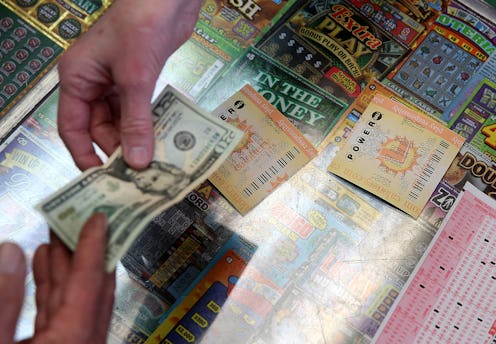
The Powerball jackpot has been growing rapidly since June, with each twice-weekly drawing failing to yield a winner. As a result, the jackpot came out to a whopping $700 million by the time of Wednesday night's drawing, making this Powerball's second-largest lottery jackpot in its history. Had a winner also failed to come forward on Wednesday, the jackpot may well have surpassed the current jackpot record of $1.6 billion — but that is no longer a possibility, because Powerball 2017 has a winner: the winner has not revealed themselves yet, but they bought the ticket in Massachusetts.
Update: CBS Boston reported that Mavis Wanczyk bought the winning ticket at 2:30 p.m. on Wednesday.
Earlier: As more people entered the lottery, the Powerball jackpot continued to grow. In 2015, Powerball increased the number of balls in play from 59 to 69, significantly reducing the odds of picking the correct combination of numbers. In fact, the odds are down from one in 175 million two years ago to one in roughly 292 million now. However, these odds certainly didn't stop the winner from becoming a millionaire.
Now, the winner has two choices: to accept the jackpot as a lump sum or as an annuity. If they choose to take it as annuity, they will receive one payment immediately and 29 subsequent payments on a yearly basis. Moreover, Powerball specifies on its website that the annual payment grows by five percent every year "to keep up with the cost of living."
Their other option would be to take the prize as a lump sum, which means they would receive the entire jackpot in one immediate payment. If they do this, however, the total prize they receive won't quite come out to $700 million. Instead, Wednesday's lump sum total comes out to approximately $443.3 million, which is still a staggering amount of money.
The public may not find out what decision the lucky ticket buyer made for quite some time, but if one thing's for certain, it's that the winner won't have to split the money. Such was not the case in January 2016 when the inconceivable $1.6 billion prize was split between three winners: one in Florida, one in Tennessee, and one in California. According to CNN Money, each winner had the choice to receive a lump sum of $187.2 million total. And fortunately for them, lottery winners in California, Tennessee, and Florida don't have to pay state income tax.
The winner of Wednesday evening's historic Powerball jackpot will surely have some big decisions to make in the near future.